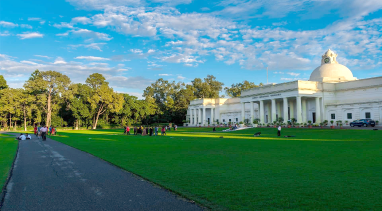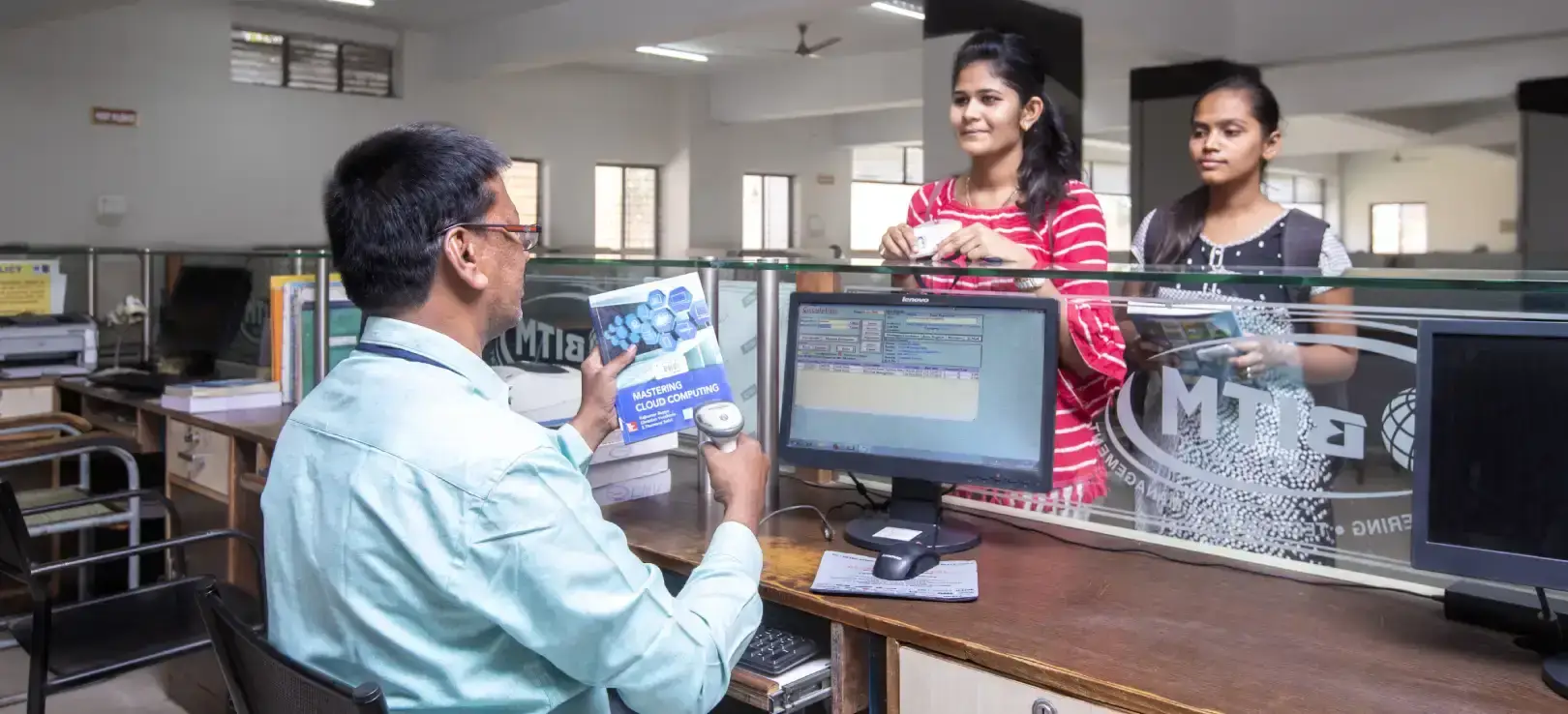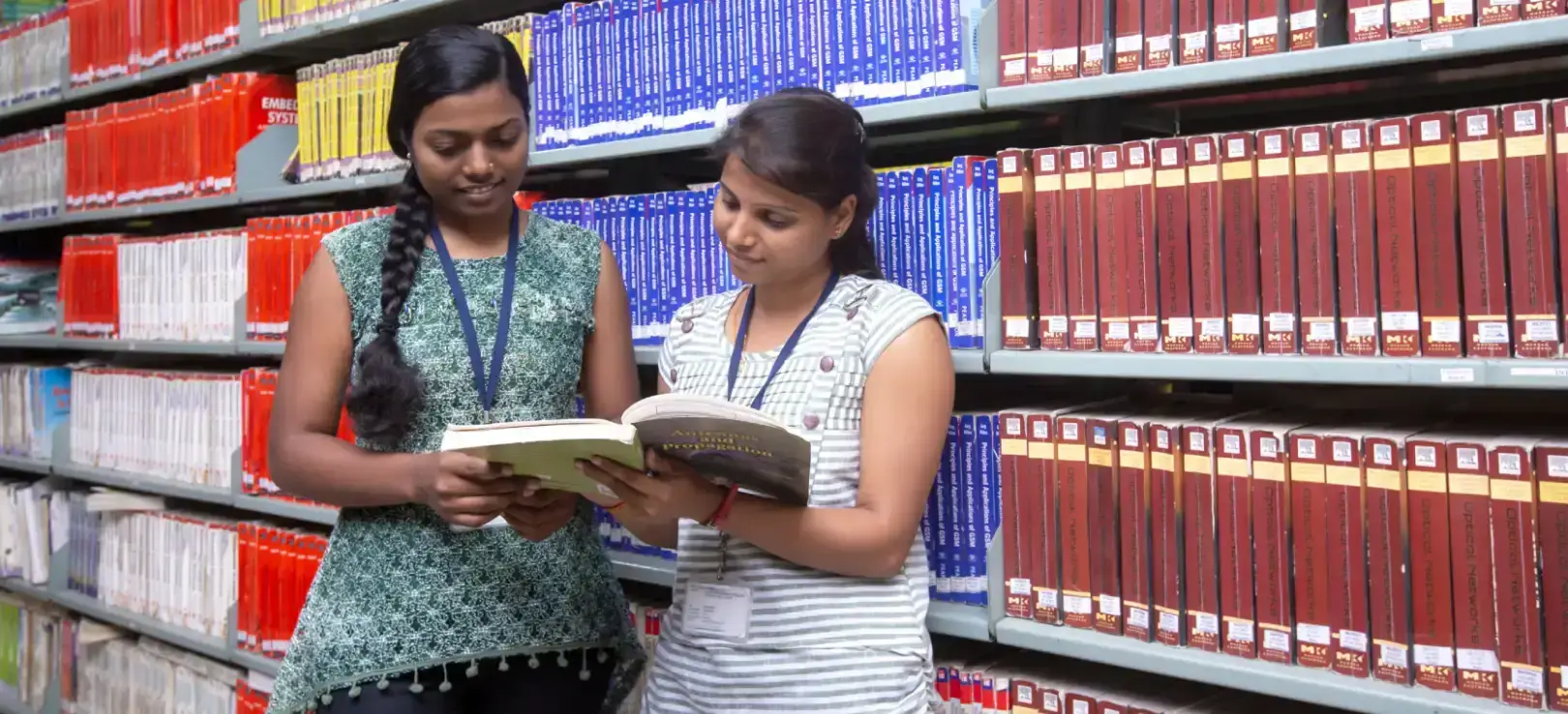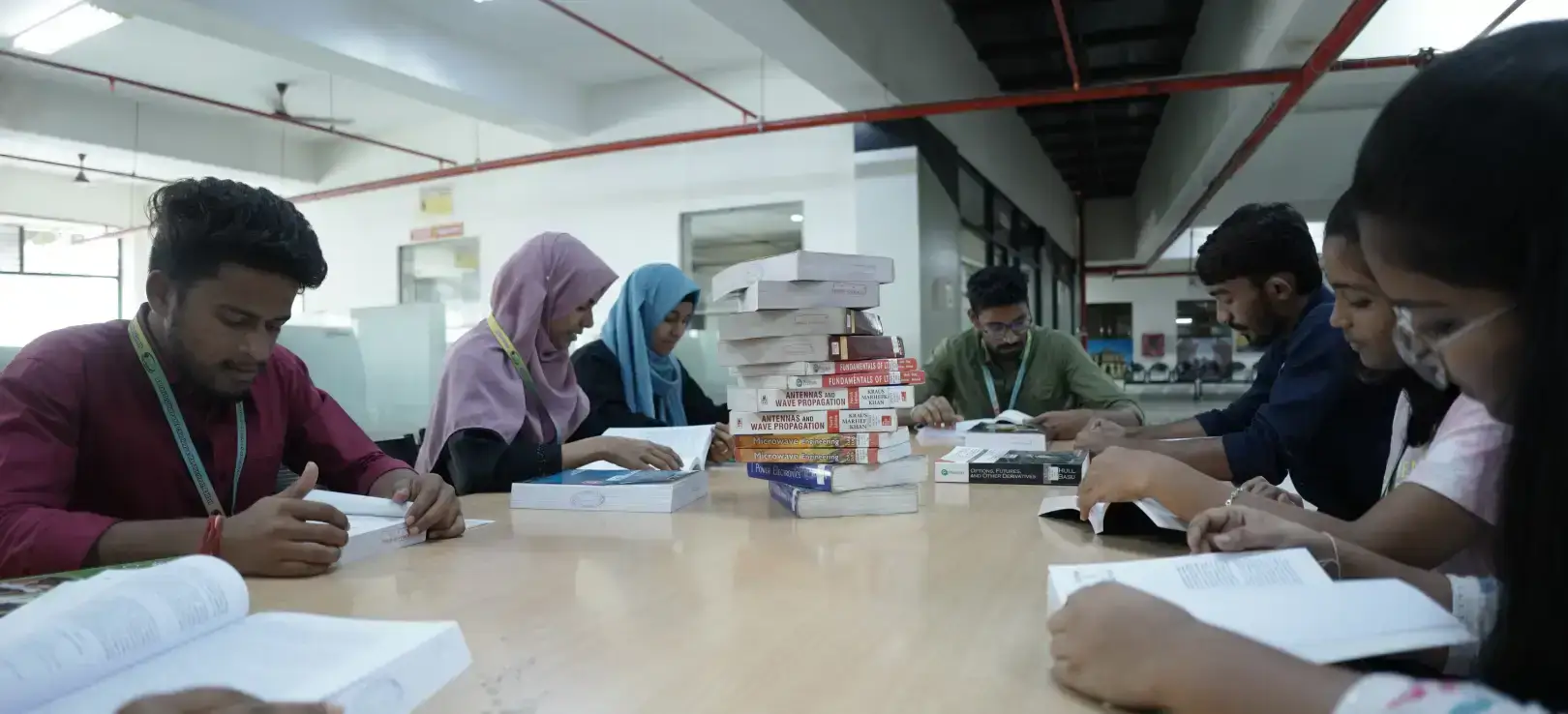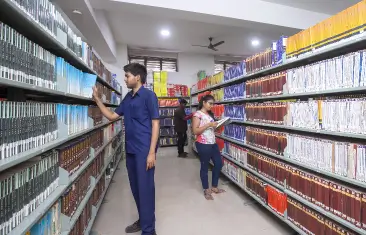The BITM Library, also known as the Knowledge Centre, is a vital component of our institution, supporting and enriching academic activities. Located across 1100.96 square meters, our library offers seating for approximately 500 members and boasts an extensive collection of resources to support diverse academic needs.
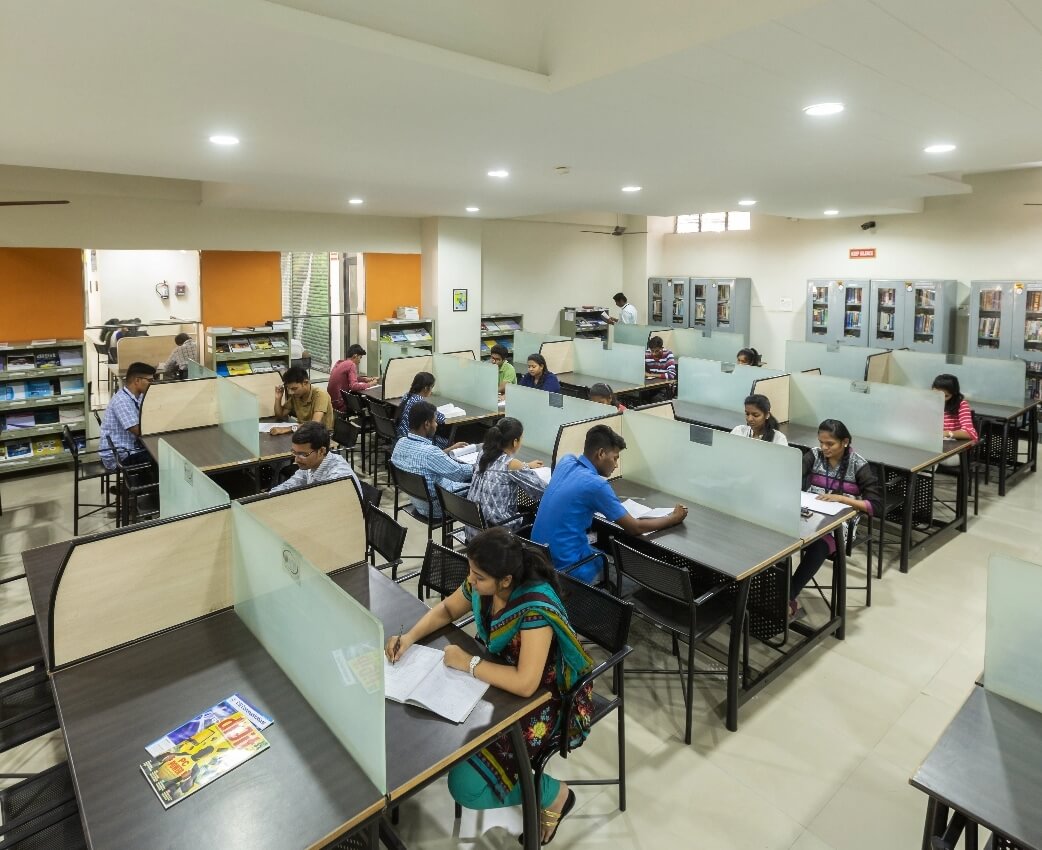
Collection Highlights
Books : 102519 volumes across 11,517 titles in Engineering, Management, MCA, and Humanities
E-Books: 1893 titles from various publishers.
Print Journals: 73 print copies of national and international journals, fulfilling AICTE requirements.
E-Journals: Subscribed through VTU-Consortium
E-Journals
E-Books
Technical platforms
Technological Platforms
KNIMBUS: Cloud server offering Universal Federation search services, Remote Access Solutions, and the mLibrary mobile app.
DrillBit: Plagiarism detection software.
Security
The library is equipped with a Closed Circuit Television (CCTV) system to ensure enhanced security.
Automation
The library is fully automated with barcode-based computerized circulation and web OPAC using Easylib software, upgraded to the 6.4a cloud version on December 10, 2022.
IRINS
Library Working Hours
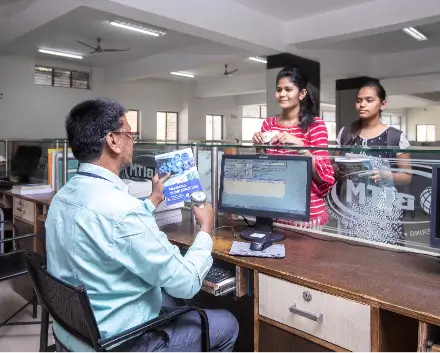
Regular Working Days: 9:00 AM – 10:00 PM
During Vacation: 9:00 AM – 5:30 PM
Lunch Break: 2:00 PM – 3:00 PM
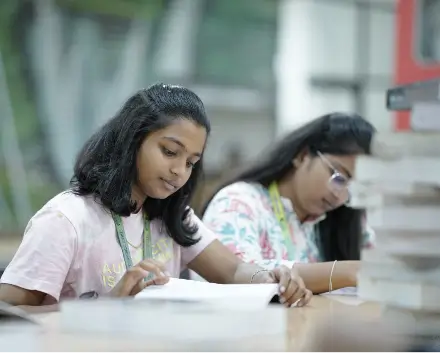
- Conservation and Preservation: Safeguard and maintain knowledge for future generations.
- Access and Communication: Facilitate access to knowledge, promote scholarly communication, and provide essential information to support academic programs.
- Diverse Educational Materials: Offer a broad range of educational resources in various formats and difficulty levels, presenting multiple perspectives to cater to diverse interests and needs.
- Program Support and Development: Support new and existing academic programs through targeted collection development (both print and digital), collaborating with faculty to recommend, acquire, and evaluate new titles and services.
- Independent Learning: Foster lifelong learning beyond the curriculum, empowering students to explore and grow independently.
- Integrated Services: Develop and enhance library services that blend physical and virtual collections for a comprehensive user experience.
- Team Building and Learning: Promote collaborative learning and team-building among students.
- Open Access System: The library operates on an open access system, allowing users to browse freely.
- User Registration: All students and users must sign in at the gate register upon entering the library.
- Maintaining Decorum: Users must maintain silence and respect others' study time. Disruptive behavior is not permitted.
- Library Sections: The library includes the Stack Area, Reference Section, Periodicals Section, Reprographics and Digital Library, Audio-Visual & Central Computing Centre, and a Social Reading Area.
- Reference Collection: Our Reference Section houses encyclopedias, dictionaries, handbooks, atlases, competitive exam books, and more. These materials are not for borrowing outside the library without special authorization.
- Collection Development: We follow a robust collection development policy to support teaching, learning, and research with a mix of print and electronic resources.
- Automation: The library uses Easylib Web Version 6.4a for automated operations, and all books are bar-coded.
- Discipline: Eating, group discussions, and napping are prohibited. Users should maintain discipline and respect library norms.
- Cooperation: Users are expected to cooperate with library staff to ensure smooth operations.
- Prohibited Actions: Theft or defacement of library materials is a serious offense.
- Personal Belongings: Personal belongings should be left at the property counter near the security checkpoint. They are not allowed inside the library.
- Subscriptions: The library subscribes to both National Print Journals and online journals. Newspapers and magazines are available in the Reading Room.
- E-Resources: Lists of subscribed e-resources are displayed on the notice board and library website.
- Syllabus Copy: Students are required to carry their syllabus copy while using the library.
- Mobile Phones: Use of mobile phones is strictly prohibited within the library.
- Furniture: Please do not move tables, chairs, or other furniture. Keep them in their designated places.
- Personal Materials: The library is not responsible for any loss of personal items brought inside.
- Feedback: Suggestions or complaints can be submitted through the Suggestion Box/Register available with the Library Coordinator or Librarian.
- Our library's collection development policy emphasizes a collaborative approach. Recommendations for collection requirements are gathered from subject experts across all departments. These recommendations are reviewed and approved by the Library Advisory Committee to ensure the selection process is comprehensive and academically relevant. This careful curation helps us maintain a high-quality and relevant collection that meets the diverse needs of our faculty students and researchers.
- Access and Usage: Students should request books from the Reference Section Librarian, record the request in the register, and return the books upon leaving the Reference Section.
- Materials Available: The Reference Section includes:
- Subscribed print journals
- Reference books such as encyclopedias, dictionaries, thesauri, atlases, competitive exam guides, and reference handbooks
- Overnight Lending: Reference books may be issued overnight with written permission from the Librarian.
- Question Papers: Previous question papers are not available for external issuance. Soft copies can be accessed on the institute’s website.
- Capacity: The Reading Room accommodates up to 500 students.
- Materials: Students may bring their own study materials. The room features:
- Technical, business management, and general magazines
- Leading national newspapers in English, Kannada, and Telugu
Digital Library Facilities
- E-Resource Centre: Equipped with 23 multimedia systems for accessing e-books, research papers, academic journals, and other digital materials.
- KNIMBUS Remote Access Platform & Mobile App (mLibrary): Provides a unified search and access point for all subscribed and open-access e-resources, including e-journals, e-books, and e-databases, with remote access capabilities.
- DrillBit Plagiarism Check Software: Cloud-based tool for detecting copied or plagiarized content from academic publishers, journals, web pages, theses, dissertations, conference papers, and student submissions.
- Open Access: Free access to all library resources.
- Book Lending Service: Automated issue and return of books.
- Reprographic Services: Photocopying services available.
- Library OPAC: Web-based Online Public Access Catalogue for easy resource searching.
- Current Awareness Services (CAS): Updates on new acquisitions and relevant resources.
- Bibliographic Services: Assistance with finding and citing resources.
- SC/ST Book Service: Specialized book service for SC/ST students.
- E-Resources Browsing and Downloading: Access and download e-resources.
- Newspaper Clipping Service: Collection of relevant newspaper clippings.
- An active part is taken by the library in the orientation programme organized by the institute for the benefit of new students at the beginning of the academic year. The new students are shown around the library to familiarize them with various resources and services available
- Any user who wishes to know more about library resources and services or to learn how to use a particular resource such as OPAC, e-journals, or databases should contact Librarian/Library Staff.
- Training and workshops are also organized on e-Resources for faculty, students and Research scholars. Resource persons from various publishers are being invited to deliver training on the e-resources subscribed by Library.
- New staff members joining the institute are required to apply for Staff Member accounts for library. Staff must complete a Library Membership Registration Form and submit it to the Librarian. A library account will then be created for the staff member.
- All admitted students are automatically library members. To activate their library membership, students must present their college fee paid receipt and Identity Card.
- ID and College Fee Receipt: Books will be issued upon presenting a valid college ID card and a receipt confirming payment of college fees.
- Faculty Borrowing Limits: Teaching staff may borrow up to 10 books per semester. Books must be renewed at the end of each semester if continued use is desired.
- Copy Limits: Multiple copies of the same book cannot be issued.
- Issue Counter: Requests for books should be made at the issue counter.
- Book Condition: Inspect books for damage at the issue counter before leaving. Report any existing damage to the Chief Librarian for possible exchange.
- Responsibility: Borrowers are responsible for any damage to borrowed materials. Fines will be imposed for damages according to library rules.
- Student Book Lending:
- Book Bank Section: Books are issued for one semester.
- Circulation Section: Books are issued for 10 days. Return books by the due date specified on the due date slip.
- Book Bank Returns: Books must be returned the day after the semester exams conclude.
- Due Dates: Check due dates before leaving the issue counter.
- Lost Books: In case of loss, the borrower must replace the book with a new copy (same or latest edition) or pay double the cost of the book plus any applicable fines.
- Availability: Book issuance is subject to availability.
- Presence Required: Students must be present for issuing and receiving books.
- Post-Exam Returns: All books must be returned immediately after semester exams.
- Outgoing students must obtain a No Due Certificate from the library to receive their convocation or transfer certificates.
- Staff members must obtain a No Due Certificate from the library when they leave the institute. This certificate verifies that there is no outstanding of library materials.
- General Fines: All books will incur fines as specified in the library rules.
- Barcode Labels: Books are classified and labeled with barcode stickers. Tampering with these labels will incur a fine of ₹10 per label.
- Damage and Loss:
- Tampering or Loss of Pages: May result in binding costs or replacement charges for the book.
- Replacement for Lost Books: Only the latest edition of the book will be accepted for replacement, along with a processing fee of ₹50. If not replaced, double the cost of the book will be charged.
- Overdue Books: Books returned after the due date will attract an overdue fine of ₹5 per book per day.
| No | Digital Library | Link |
|---|---|---|
| 1 | VTU-eLearning Lecture Videos (Campus LAN) | http://10.0.3.195/econtent/ |
| 2 | BITM Lecture Videos (Campus LAN) | ftp://10.0.3.196/ Username is Student & Password is Bitm123# Use Internet Explorer Browser |
| 3 | Vtu E-Learning Centre, Mysuru The VTU e-Learning Centre was established in August 2003 in Mysuru with the main aim of facilitating distance education and training to the students and faculty of VTU through satellite and web. Currently, VTU e-Learning Centre has migrated from a satellite-based EDUSAT program to a web-based eShikshana program. |
http://elearning.vtu.ac.in/esk3.php |
| 4 | CEC-UGC YouTube channel: provides access to unlimited educational curriculum-based lectures free. | https://www.youtube.com/user/cecedusat |
| 5 | e-Content courseware in UG subjects: e-content in 87 Undergraduate courses with about 24,110 e-content modules is available on the CEC website at | https://cec.nic.in/ |
| 6 | NPTEL: is an educational initiative, involving 7 IITs (Bombay, Delhi, Guwahati, Kanpur, Kharagpur, Madras, Roorkee) and IISc Bangalore to promote quality education through E-learning methods. | https://nptel.ac.in/ |
| 7 | E-Yantra: e-Yantra is a robotics outreach program funded by the Ministry of Education and hosted at IIT Bombay. The goal is to harness the talent of young engineers to solve problems using technology across various domains such as agriculture, manufacturing, defense, home, smart-city maintenance, and service industries. | https://www.e-yantra.org/ |
| 8 | SWAYAM On-line Courses: 1. Provides access to best teaching learning resources which were earlier delivered on the SWAYAM Platform and may be now viewed by any learner free of cost without any registration. Students/learners who registered on SWAYA M (swayam.gov.in) in the January 2020 semester can continue their learning as usual” learning as usual. | https://swayam.gov.in/ |
| 9 | Â IRINS [Indian Research Information Network System] IRINS is a web-based Research Information Management (RIM) service developed by the Information and Library Network (INFLIBNET) Centre. The portal facilitates the academic, R&D organizations faculty members, and scientists to collect, curate, and showcase scholarly communication activities and provide an opportunity to create a scholarly network. The IRINS is available as a free software-as-service to academic and R&D organizations in India. |
https://irins.org/irins/ |
| 10 | National Digital Library(NDLI): is a digital repository of a vast amount of academic content in different formats and provides interface support for leading Indian languages for all academic levels including researchers and life-long learners, all disciplines, all popular forms of access devices and differently-abled learners | https://ndl.iitkgp.ac.in/ |
| 11 | e-PG Patbshala hosts high-quality, curriculum-based, interactive e-content containing 23,000 modules ( e-text and video) in 70 Post Graduate disciplines of social sciences, arts, fine arts and humanities, natural & mathematical sciences., | https://epgp.inflibnet.ac.in/ |
| 12 | Shodbganga: is a digital repository platform of 2, 60,000 Indian Electronic Theses and Dissertations for research students to deposit their Ph.D. theses and make them available to the entire scholarly community in open access | https://shodhganga.inflibnet.ac.in/ |
| 13 | Spoken Tutorial:Â Spoken Tutorial Forums is a friendly online discussion forum. You can join existing discussions or start new topics, and get lots of replies from the Spoken Tutorial community. Registration to Forums is completely free and takes only one minute. | https://spoken-tutorial.org/ |
| 14 | Information and Library Network (INFLIBNET) Centre, Gandhinagar is an Autonomous Inter-University Centre (IUC) of the University Grants Commission, New Delhi (Ministry of Education, Govt. of India). It is a major National Programme initiated by the UGC on 27th February 1991 as a project under the IUCAA, it became an independent Inter-University Centre on 16th May 1996. INFLIBNET is involved in modernizing university libraries in India using state-of-the-art technologies for the optimum utilization of information. | https://www.inflibnet.ac.in/ |
| 15 | SWAYAMPRABHA: is a group of 32 DTH channels providing high-quality educational curriculum-based course contents covering diverse disciplines such as arts, science, commerce, performing arts, social sciences and humanities subjects, engineering, technology, law, medicine, agriculture, etc. to all teachers, students, and citizens across the country interested in lifelong learning. These channels are free to air and can also be accessed through your cable operator. The telecasted videos/lectures are also archived videos on the Swayamprabha portal. | https://www.swayamprabha.gov.in/ |
| 16 | Vidwan is a database of experts that provides information about experts to peers, prospective collaborators, funding agencies policymakers, and research scholars in the country. Faculty members are requested to register on the Vidwan portal to help expand the database of experts. | https://vidwan.inflibnet.ac.in/ |
| 17 | Digital Books Kannada(Open source) | https://archive.org/details/ServantsOfKnowledge |
| 18 | Digital Books English (Open source) | https://archive.org/details/books |
Online Public Access Catalogues (OPAC) is an online database of materials held by a library through which users search a library catalog principally to locate books and collections available in the library.
Web OPAC: https://bitm.easylib.net/
Note: The username is your library number & Password is the same.
Mobile App
easylib bitm
Previous Year Question Papers
| Sixth Semester B.E. Degree Examinations, June/July 2025 | |
| Fourth Semester B.E. Degree Examinations, June/July 2025 | |
| Eight Semester B.E. Degree Examinations, April-May 2025 | |
| Seventh Semester B.E. Degree Examinations, February 2025 | |
| Fifth Semester B.E. Degree Examinations, February 2025 | |
| I Year & III sem Previous year Question Paper JAN-FEB 2025 | |
| VTU Model Question Papers | https://vtu.ac.in/model-question-paper-b-e-b-tech-b-arch/ |
| First Semester B.E. Degree Examinations, May 2022 | Engineering (U.G) (2021-22 ODD Sem) |
| First/Second Semester B.E. Degree Examinations, Sept/Oct 2022 | Engineering (UG) Sept/Oct 2022 [Even Semester] |
| First Semester B.E. Degree make-up Examinations August 2023 | Makeup Exam (U.G) (2021-22 ODD Sem) |
| BE 2nd Sem Model Question Paper Sep/Oct 2023 | |
| BE 4th Sem Civil Model Question Paper Sep/Oct 2023 | |
| BE 4th Sem CSE-AIML Model Question Paper Sep/Oct 2023 | |
| BE 4th Sem ECE Model Question Paper Sep/Oct 2023 | |
| BE 4th Sem EEE Model Question Paper Sep/Oct 2023 | |
| BE 4th Sem ME Model Question Paper Sep/Oct 2023 | |
| First Semester B.E. Degree Examinations, April/May2023 | |
| Second Semester B.E. Degree Examinations SeptOct 2023 | |
| Third Semester B.E. Degree Examinations, March/April 2023 | |
| Fourth Semester B.E. Degree Examinations, SeptemberOctober 2023 | |
| First Semester B.E. Degree Examinations, April/May 2023 | |
| 3rd Semester Model Question Papers-2021-22 | |
| First Semester B.E. Degree Examinations, March April 2024 | |
| Third Semester B.E. Degree Examinations, March April 2024 | |
| Fifth Semester B.E. Degree Examinations, April May 2024 | |
| Sixth Semester B.E. Degree Examinations, September/October 2024 | |
| IV-ECE Fourth Semester B.E. Degree Examination – September 2024 | |
| VI-ECE -Sixth Semester B.E. Degree Examination – September 2024 | |
| Third Semester B.E. Degree Examinations, September 2024 | |
| Third/Fourth/Fifth 2021 Scheme Semester B.E. Degree Examinations, September/October 2024 | |
| Sixth Semester 2021 Scheme B.E. Degree Examinations, September/October 2024 |
| Fourth Semester MBA Degree Examinations, October/ November 2025 | |
| EXPORT IMPORT MANAGEMENT | Click To View |
| INTEGRATED MARKETING COMMUNICATION & ADVERTISING | Click To View |
| INTERNATIONAL HUMAN RESOURCE MANAGEMENT | Click To View |
| R PROGRAMMING FOR MANAGERS | Click To View |
| PROJECT MANAGEMENT | Click To View |
| RISK MANAGEMENT AND INSURANCE | Click To View |
| FINANCIAL DERIVATIVES | Click To View |
| INDIRECT TAXATION | Click To View |
| LEADERSHIP AND BUILDING ORGANIZATION | Click To View |
| GLOBAL SUPPLY CHAIN MANAGEMENT | Click To View |
| ENTERPRISE RESOURCE PLANNING | Click To View |
| PERSONAL GROWTH AND INTERPERSONAL EFFECTIVENESS | Click To View |
| SALES MANAGEMENT | Click To View |
| DIGITAL AND SOCIAL MEDIA MARKETING | Click To View |
| PORT AND AIRPORT MANAGEMENT FOR LOGISTICS | Click To View |
| First / Second Semester B.E.Degree Examinations, September/October 2025 | |
| BEE13-23-SS-September 2025 | Click To View |
| CHEC12-22-SS-September 2025 | Click To View |
| CHEE12-22-SS-September 2025 | Click To View |
| CHEM12-22-SS-September 2025 | Click To View |
| ETC15-25J-SS-September 2025 | Click To View |
| IDT18-28-SS-September 2025 | Click To View |
| SFH18-28-SS-September 2025 | Click To View |
| ETC15-25E-SS-September 2025 | Click To View |
| ETC15-25H-SS-September 2025 | Click To View |
| CHES12-22-SS-September 2025 | Click To View |
| EEE13-23-SS-September 2025 | Click To View |
| MATC21-SS-September 2025 | Click To View |
| MATE21-SS-September 2025 | Click To View |
| MATM21-SS-September 2025 | Click To View |
| MATS21-SS-September 2025 | Click To View |
| PLC25D-SS-September 2025 | Click To View |
| POP13-23-SS-September 2025 | Click To View |
| ESC145-SS-September 2025 | Click To View |
| MATC11-SS-September 2025 | Click To View |
| MATE11-SS-September 2025 | Click To View |
| MATM11-SS-September 2025 | Click To View |
| MATS11-SS-September 2025 | Click To View |
| PHYE12-22-SS-September 2025 | Click To View |
| PHYC12-22-SS-September 2025 | Click To View |
| PHYM12-22-SS-September 2025 | Click To View |
| ESC243-SS-September 2025 | Click To View |
| ESC244-SS-September 2025 | Click To View |
| PWS26-SS-September 2025 | Click To View |
| PHYS12-22-SS-September 2025 | Click To View |
| Second Semester MBA Degree Examinations, August/September 2025 | |
| MBA201-Aug-Sept 2025 | Click To View |
| MBA205-August-September 2025 | Click To View |
| MBA206-August-September 2025 | Click To View |
| MBA204-August-September 2025 | Click To View |
| MBA202-Aug-Sept 2025 | Click To View |
| MBA203-Aug-Sept 2025 | Click To View |
| First Semester MBA Degree Examinations, April 2025 | |
| BUSINESS ENGLISH | Click To View |
| MARKETING MANAGEMENT | Click To View |
| MANAGEMENT AND ORGANIZATIONAL BEHAVIOUR | Click To View |
| ECONOMICS FOR DECISION MAKING | Click To View |
| ACCOUNTING FOR MANAGERS | Click To View |
| BUSINESS STATISTICS | Click To View |
| VTU Model Question Papers | https://vtu.ac.in/model-question-paper-b-e-b-tech-b-arch/ |
| First Semester MBA Degree Examinations, June 2022 | M B A (PG) (2021-22 ODD Sem) |
| First/Second Semester MBA Degree Examinations, Oct/Nov 2022 | MBA (PG) Oct/Nov 2022 [Even Semester] |
| M.B.A 4th Sem Model Question Paper Sep/Oct 2023 | |
| Third Semester MBA Degree Examinations, May /June 2023 | MBA |
| First Semester MBA Degree Examinations, May/June 2023 | MBA 1st Sem Question Papers June 2023 Exam |
| Fourth Semester MBA Degree Examinations, Sept/Oct 2023 | MBA 4th Sem Model Question Paper Sept/Oct 2023 |
| Third Semester MBA Degree Examinations, April 2023 | MBA |
| Third Semester MBA Degree Examinations, March April 2024 | MBA |
| Second Semester MCA Degree Examinations, September 2025 | |
| DATA ANALYTICS USING PYTHON | Click To View |
| OBJECT ORIENTED PROGRAMMING USING JAVA | Click To View |
| DATA STRUCTURE AND ALGORITHMS | Click To View |
| SOFTWARE ENGINEERING | Click To View |
| WEB APPLICATION DEVELOPMENT | Click To View |
| Fourth Semester MCA Degree Examinations, September 2025 | |
| INTRODUCTION TO DATA SCIENCE | Click To View |
| SOFTWARE PROJECT MANAGEMENT | Click To View |
| INTRODUCTION TO DEVOPS | Click To View |
| STORAGE AREA NETWORK | Click To View |
| First Semester MCA Degree Examinations, April 2025 | |
| DISCRETE MATHEMATICS, GRAPH THEORY, PROBABILITY AND STATISTICS | Click To View |
| PROBLEM SOLVING USING C | Click To View |
| WEB TECHNOLOGIES | Click To View |
| OPERATING SYSTEM | Click To View |
| DATABASE MANAGEMENT SYSTEMS | Click To View |
| RESEARCH METHODOLOGY AND IPR | Click To View |
| First Semester MCA Degree Examinations, November 2024 | |
| Mathematical Foundation For Computer Applications | Click To View |
| Operating System With Unix | Click To View |
| Data Structures And Applications | Click To View |
| Software Engineering & project Management | Click To View |
| Web Technologies | Click To View |
| Second Semester MCA Degree Examinations, November 2024 | |
| Datebase Management System | Click To View |
| Object Oriented Programming With Java | Click To View |
| Computer Networks | Click To View |
| Introduction To Python | Click To View |
| Cyber Security | Click To View |
| Introduction To Artificial Intelligence | Click To View |
